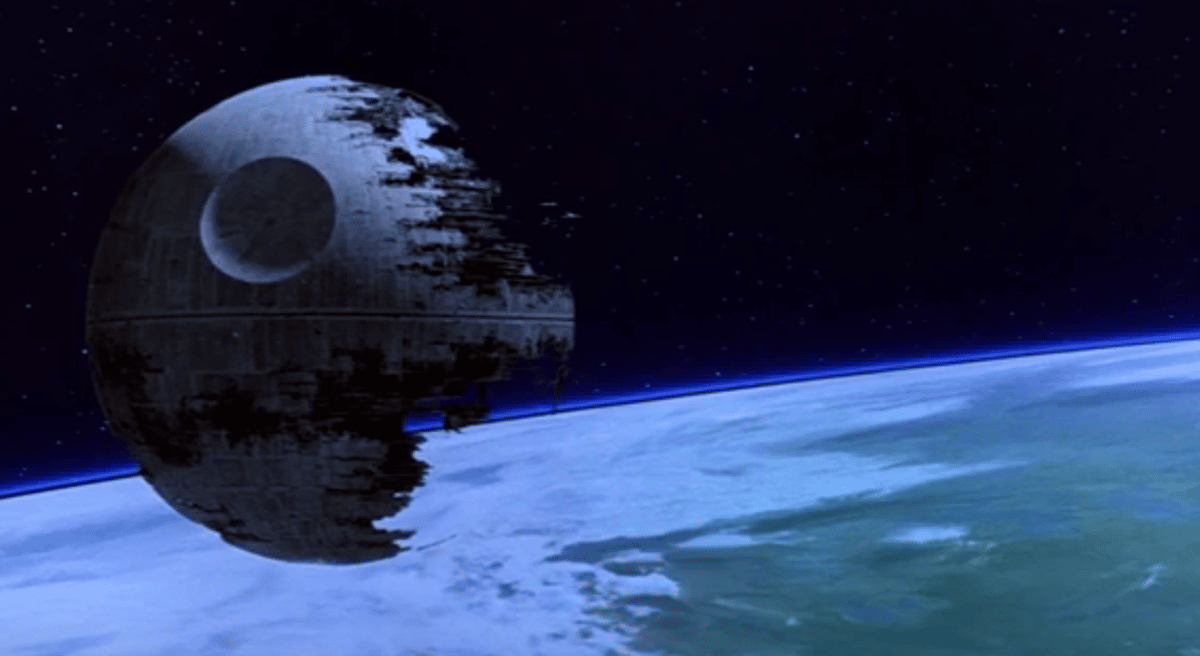The American media’s Ukraine narrative is a vast deception that functions as a reassuring fantasy. The facts on the ground in Ukraine have overwhelmed the narrative being deployed in the West, but the American media simply ignores those facts. The effect is to placate the American people in service to the American state.
The American state has learned well the lessons of Hollywood. The blockbuster film Star Wars (1977) allowed the American people, disillusioned from the recent defeat in Vietnam, to project onto and root for a victorious rebel insurgency. The state-driven media presentation of the Russian war in Ukraine allows the American people, disillusioned from the recent defeat in Afghanistan, to once again root for a courageous and likable insurgency.
Unfortunately, while Hollywood film sets occasionally get someone killed, the state’s productions always involve mass death and destruction. The media’s narrative can be reduced to the Evil Empire (Russia) vs. the Rebel Alliance (Ukraine). This deception, of course, is made possible by an actual war in Ukraine. It is a war the American state helped provoke and is helping to prolong. Thousands have been killed. Millions have been displaced. And there is no end in sight.
Putin’s Desire: The Evil Empire
The Americna media would have us believe that former KGB agent and professional liar Vladimir Putin (the most dangerous man in the world) is an unhinged, paranoid, aggrieved, insecure, manipulative, unpredictable bully who runs the Kremlin like a royal court and desires to reconstitute the Russian Empire with himself as a New Tsar. Hence his unprovoked invasion of Ukraine on February 24 of this year.
“Russia without Ukraine is a country. Russia with Ukraine is an Empire,” said Daniel Fried, U.S. Assistant Secretary of State for European and Eurasian Affairs from 2005-2009.
This idea, popular with our foreign policy elite, is often attributed to the Polish-American political scientist Zbigniew Brzeziński. Sadly, it is a tellingly vulgarized version of what Brzenzinski actually said:
“Without Ukraine, Russia ceases to be a Eurasian empire. Russia without Ukraine can still strive for imperial status, but it would then become a predominantly Asian imperial state…. (Brzezinski, Zbigniew. The Grand Chessboard (p. 46). Basic Books. Kindle Edition)”
Don’t expect accuracy and/or coherence from the D.C. foreign policy establishment. But at least they get close to what Brzezinski said. Their narrative of Russia’s war in Ukraine is pure fantasy.
Fuck Around and Find Out: The Insurgency
Now don’t lose hope, the American media assures us. What Putin didn’t count on was the heroic resolve of the Ukrainian people and its noble, democratic, pro-Western, U.S.-backed government. From a “gun toting granny” to newlyweds taking up arms, all of Ukraine has joined the fight aginst the Evil Empire.
“Ukraine citizens have continued to show incredible signs of resistance, proving that they truly are the ‘fuck around and find out’ country of Eastern Europe,” said comedian John Oliver on his show Last Week Tonight.
Putting aside the fact that Ukraine is east of what was called Eastern Europe during the Cold War, the D.C. elite have been planning for Russia to “find out” for months, maybe even years.
On Dec. 19, 2021, the journalist David Ignatius, writing in The Washington Post, said:
When U.S. troops were poised on the border of Iraq in 2003, U.S. officials didn’t consider the grinding, enervating war of counterinsurgency that lay ahead. The Biden administration believes that Putin may be on the verge of making a similar mistake in Ukraine. They hope he doesn’t make the wrong choice, but if he does invade, they want to make it hurt.
On Jan. 9, 2022, Andriy Zagorodnyuk, chairman of the Center for Defence Strategies and former Minister of Defense of Ukraine (2019–2020) wrote for the The Atlantic Council that:
Recent polls indicate very little appetite among the Russian public for a major war against Ukraine. This absence of enthusiasm could soon turn to outright opposition if large numbers of coffins began returning to Russia from Ukraine.
And on Jan. 14, 2022, journalist Helene Cooper, in The New York Times, said:
In Afghanistan, the United States showed itself to be dismal at fighting insurgencies. But when it comes to funding them, military experts say it is a different ballgame.
Cooper then quoted a D.C. insider:
If Putin invades Ukraine with a major military force, U.S. and NATO military assistance — intelligence, cyber, anti-armor and anti-air weapons, offensive naval missiles — would ratchet up significantly,” said James Stavridis, a retired four-star Navy admiral who was the supreme allied commander at NATO. “And if it turned into a Ukrainian insurgency, Putin should realize that after fighting insurgencies ourselves for two decades, we know how to arm, train and energize them.
All of this reveals a deep political psychosis within our foreign policy establishment. In 2020, news broke that Russia was (possibly / maybe / rumored to be) paying bounties to Taliban fighters to kill U.S. troops. The accusation was never corroborated with reality, but the outage it elicited in D.C. was fierce.
Yet here is our foreign policy elite openly talking about arming Ukrainians with billions of dollars worth of weapons to kill Russian troops. Do they not think Russia will be outraged? Do they not care? They should care, because Russia is a nuclear power with enough hydrogen bombs to destroy our entire nation in an afternoon.
The Star Wars Effect
It has been more than two months since Russia invaded Ukraine and we have not yet reached the insurgency stage. Watching CNN has been more confusing than usual, and I would suggest this is because its reporters and anchors want to deploy the noble insurgency narrative, but do realize Russia hasn’t actually won the war yet. The Soviet Union conquered Afghanistan and the United States also conquered Afghanistan (and then Iraq) before those respective insurgencies could begin to bleed them.
But that’s merely inconvenient facts on the ground.
The West wants its Rebel Alliance. The West will have its Rebel Alliance. It’s been less than a year since the U.S. withdrew from Afghanistan. We spent almost 20 years and more than $2 trillion dollars toppling the Taliban government, conquering and occupying the country, as well as creating and propping up its new government. More than 2,000 U.S. soldiers and more than 3,000 U.S. contractors were killed. More than 20,000 U.S. soldiers were wounded, most of them suffering multiple limb loss and many suffering traumatic brain injuries. Tens of thousands of veterans of the war came home and committed suicide. With 775,000 troops sent to fight in Afghanistan, perhaps hundreds of thousands of veterans silently suffer from moral injury.
And what did we get for it? We hadn’t even completed our withdrawal last August when the Afghan government and its military (both of which we had created) completely collapsed. The Taliban took most of the country back, including the capitol city Kabul.
Americans had to wait more than two years after the “Fall of Saigon” to root for the rebels in the original Star Wars. They only had to wait a little less than six months for Russia to invade Ukraine following the catastrophic Afghan exit. And the America media was hyping the invasion for months before that.
Star Wars and the War in Ukraine
When Star Wars was released in 1977, critics didn’t view it as a Vietnam allegory. Writing in The New Yorker, film critic Pauline Kael said:
There’s no breather in the picture, no lyricism; the only attempt at beauty is in the double sunset. It’s enjoyable on its own terms, but it’s exhausting, too: like taking a pack of kids to the circus.
Kael’s view is representative of the initial critical response to Star Wars. However, film critics did begin to view the movie allegorically. In his article “Dreams and Nightmares in the Hollywood Blockbuster,” Joseph Sartelle said:
The Star Wars trilogy imagined the Cold War as a battle in which the Rebel Alliance, composed of white heroes and their differently speciesed helpers in a pastiche of American liberal pluralism, prevails over the evil Galactic Empire, whose military men wore uniforms that looked suspiciously like those of the Soviets.
Sartelle was onto something. Unfortunately for him, Gareth Porter had not yet published The Perils of Dominance. The Soviets were never at Galactic Empire level and the U.S. National Security elite knew it.
The American historian Daniel Immerwahr, author of the book How to Hide An Empire, has provided an allegorical reading of Star Wars that aligns with the facts on the ground: The United States is the Galactic Empire. The Rebel Alliance is the Vietnamese.
Vietnam was depressing for the American people. Star Wars was fun. Likewise, last year’s defeat in Afghanistan was deeply upsetting. Ukraine is fun. We get to be mad and root for the good guys. (And they’re winning!) We get to tag our social media posts with the Ukraine flag emoji and fly the Ukraine flag in our yards. We might not know how to defeat an insurgency, but we sure know how to project our psyche onto one. Star Wars taught us that.
The state, through its compliant media, is committed to keeping the “show” going. The Western consensus appears to be that, at some point, Kiev will fall. Then we’ll get to unleash our heroic insurgency on the Russians. If that means we fight the Russians to the last Ukrainian, then fight them we will. And God forbid peace breaks out too soon.
On April 5, 2022, less than a month into the war, Michael Birnbaum and Missy Ryan, writing in the Washington Post, in an article called “NATO says Ukraine to decide on peace deal with Russia — within limits,” said:
Even a Ukrainian vow not to join NATO — a concession that Zelensky has floated publicly — could be a concern to some neighbors. That leads to an awkward reality: For some in NATO, it’s better for the Ukrainians to keep fighting, and dying, than to achieve a peace that comes too early or at too high a cost to Kyiv and the rest of Europe.
Ben Afflek, speaking about Argo (2012), his film about the CIA working with Hollywood to create a fake film as cover to rescue diplomats trapped in Iran, said:
One of the themes of Argo is about storytelling and how powerful it is. From political theater to the way we kind of communicate to our children to the way that we inspire people, you know. And it’s interesting that Hollywood and uh, you know, the clandestine services both spend most of their time convincing people that something that’s not true is in fact true.
How true that is.
































